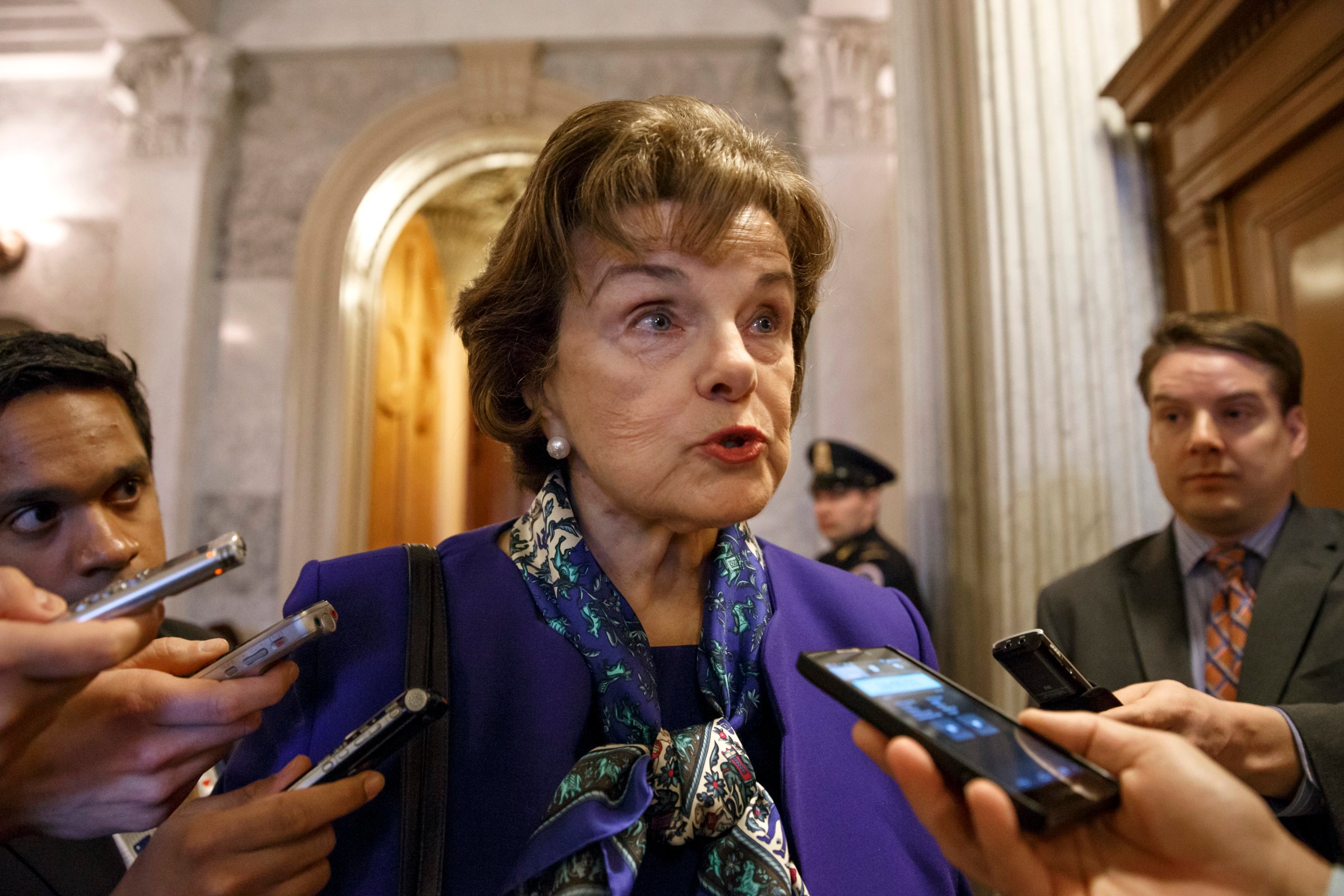
In the mid-1990s, Sen. Dianne Feinstein was trying to push an assault weapons ban through Congress. One day, the California Democrat was arguing for her bill on the floor when Sen. Larry Craig, an Idaho Republican, stood up and interrupted her. He patronizingly offered to teach her something about guns.
Feinstein coldly informed Craig that Harvey Milk, one of her colleagues on the San Francisco Board of Supervisors, had been shot to death, and that George Moscone, her predecessor as mayor of San Francisco, had been assassinated.
Texas Republican Sen. Ted Cruz made a similar mistake last year while arguing against the gun reform bill that grew out of the Sandy Hook school massacre. “I am not a sixth grader,” Feinstein responded to Cruz in the Judiciary Committee markup. “I have been on this Committee for 20 years. I was a mayor for nine years. I walked in, I saw people shot. I have looked at bodies that have been shot with these weapons. I have seen the bullets that implode. In Sandy Hook, youngsters were dismembered. It is fine you want to lecture me on the Constitution. I appreciate it. Just know I have been here for a long time. I have passed on a number of bills. I have studied the Constitution myself. I am reasonably well educated, and I thank you for the lecture. … I come from a different place than you do. I respect your views. I ask you to respect my views.”
As the oldest current sitting senator, Feinstein, 80, may look like a sweet granny, but boy, is it a bad idea to cross her, something the Central Intelligence Agency is just learning. Feinstein, the first female chair of the Senate Select Committee on Intelligence, has often defended the CIA in the past on its surveillance tactics. But when the spy agency apparently used those same tactics against her, allegedly hacking her staff’s computers and stealing sensitive files, Feinstein was having none of it. Her speech taking the CIA to task on the floor of the Senate Tuesday morning was jaw dropping.
“I’ve had the privilege of serving in this body, now my 40th year. I’ve heard thousands of speeches on this floor. I cannot think of any speech by any member of either party as important as the one the Senator from California just gave,” marveled Senate Judiciary Committee Chairman Patrick Leahy, a Vermont Democrat.
As a woman that she herself says lived in a man’s world for decades after she arrived in Washington, Feinstein has worked hard to bring diversity to the intelligence community. “Even from when I came to the Senate it has changed dramatically in that regard [from] being all male,” she told TIME in an interview late last year.
She holds regular dinners for women in the sector. Her pantsuits, pearls and cordial demeanor can lull people into a false sense that she’s a pushover, says Bill Carrick, her longtime political adviser. “She’s very polite,” Carrick says. “But she’s also tough as nails. She’s been involved in a lot of tough issues over the years.”
In her floor speech on Tuesday, Feinstein accused the CIA of removing documents from her offices, secretly searching her staff’s computers and attempting to intimidate congressional investigators by requesting an FBI inquiry into their conduct—all charges that CIA director John Brennan disputed as “just beyond the scope of reason” within hours of Feinstein’s speech.
The Senate Select Committee on Intelligence is putting the finishing touches on an exhaustive 6,000-plus page investigation into the CIA’s Bush-era interrogation program. Feinstein said in her speech she would ask the White House to declassify the report, so that the world could see “the horrible details of the CIA program that never, never, never should have existed.”
Brennan disputes the report’s and Feinstein’s conclusions on the program. “If I did something wrong, I will go to the president,” the CIA director said in a previously scheduled speech at the Council on Foreign Relations on Tuesday. “He is the one who can ask me to stay or to go.”
Feinstein described the CIA’s actions as “a defining moment” for Congress and said they gave her “grave concerns” that the CIA had “violated the separation-of-powers principles embodied in the United States Constitution.”
Feinstein’s public speech was rare and unprecedented for a intelligence committee chair. “What made her floor statement as impactful as it was is that she’s someone who’s low key, easy to work with, not someone to cry wolf,” says John Ullyot, a former longtime GOP Senate aide who worked with Feinstein and her staff. “So when someone like her stands up and go public with the Administration of her own party, everyone listens.”
Whatever happens, the CIA seems to have lost an important ally on the Hill, one who often shielded it from Democratic and Republican attacks alike. “I don’t understand what [the CIA is] doing, at all,” Carrick says. “She’s not been unsympathetic to the intelligence agencies and their mission. But this is so out of bounds. And she’s definitely the wrong person to take on on this. She’s definitely furious.”
More Must-Reads from TIME
- Donald Trump Is TIME's 2024 Person of the Year
- Why We Chose Trump as Person of the Year
- Is Intermittent Fasting Good or Bad for You?
- The 100 Must-Read Books of 2024
- The 20 Best Christmas TV Episodes
- Column: If Optimism Feels Ridiculous Now, Try Hope
- The Future of Climate Action Is Trade Policy
- Merle Bombardieri Is Helping People Make the Baby Decision
Contact us at letters@time.com